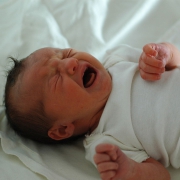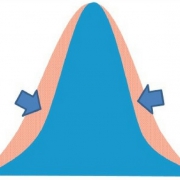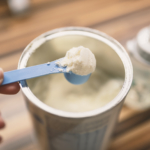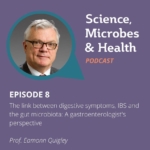Episode 7: Evidence for probiotic use in pediatric populations
Podcast: Play in new window | Download
Subscribe: Apple Podcasts | Spotify | RSS
The Science, Microbes & Health Podcast
This podcast covers emerging topics and challenges in the science of probiotics, prebiotics, synbiotics, postbiotics and fermented foods. This is the podcast of The International Scientific Association for Probiotics and Prebiotic (ISAPP), a nonprofit scientific organization dedicated to advancing the science of these fields.
Evidence for probiotic use in pediatric populations, with Prof. Michael Cabana
Episode summary:
In this episode, the ISAPP hosts discuss probiotics for pediatric populations with Prof. Michael Cabana, MD, MPH, from Albert Einstein College of Medicine and The Children’s Hospital at Montefiore. Prof. Cabana starts by acknowledging the gap between the demand for probiotic interventions and the evidence that currently exists for their efficacy. He gives an overview of the challenges in designing trials on probiotic interventions for children, and summarizes what the evidence shows to date.
Key topics from this episode:
- A concerning gap exists between the strength of evidence for probiotic interventions in children and the high demand by parents for these interventions.
- A clinician supports clinical recommendations if they are based on multiple high-quality randomized, controlled trials in different settings. Unfortunately, this level of evidence is often missing for pediatric interventions, including for probiotics.
- A clinician is less concerned about what regulatory category (drug, supplement) a recommendation falls into, and more about the level of evidence supporting its use.
- At a minimum, a clinician looks first for evidence of no harm.
- Conducting clinical trials in children presents many challenges. What are the “5 Ds”, which make clinical studies in children different from those in adults, as described by Forrest in 1997?
- A lot of adult diseases have roots in childhood, so understanding pediatric health is important not just for kids, but also for adults. Preventing adult disease starts at an early age. This is the ‘delayed payoff’ that Forrest refers to.
- Compelling evidence exists for probiotic efficacy in children for a few endpoints: colic, antibiotic-associated diarrhea, and necrotizing enterocolitis.
- When it comes to necrotizing enterocolitis, strong evidence, reproducibility, dose-response, and biological mechanisms are what give clinicians the confidence to use probiotics.
- An individual patient data meta-analysis (a project that emerged from an ISAPP meeting), enabled combining data from numerous studies that looked at the probiotic L. reuteri DSM17938 given to babies with colic. An overall positive effect was seen. Factors that predicted success in infants were being formula-fed, being younger, and not being on proton pump inhibitors.
Episode links:
- One of many reports on the growing market for probiotic products for infants and children
- Information about the 2003 Pediatric Research Equity Act (PREA) and the Best Pharmaceuticals for Children Act (BPCA) mentioned in the podcast
- The 5 “Ds” in Pediatrics mentioned in the podcast
- The TIPS study mentioned in the podcast is described here and here
- The meta-analysis on colic mentioned in the podcast
Additional resources:
ISAPP Digs Deeper into Evidence on Probiotics for Colic with New Meta-Analysis. ISAPP blog
Probiotics to Prevent Necrotizing Enterocolitis: Moving to Evidence-Based Use. ISAPP blog
About Prof. Michael Cabana, MD:
Prof. Michael Cabana, MD, MPH, is a Professor of Pediatrics & the Michael I. Cohen University Chair of Pediatrics at Albert Einstein College of Medicine, as well as Physician-in-Chief, The Children’s Hospital at Montefiore (CHAM). He is also a member of the United States Preventive Services Task Force USPSTF (here), a prestigious appointment for medical personnel to weigh evidence (risk vs. harms) on prevention interventions recommended in the United States. He is a clinical trialist (see the trials listed here), with a focus on allergy in children. He has also conducted trials using probiotic interventions. Prof. Cabana served on the ISAPP board of directors from 2008 to 2018. He has an MD from University of Pennsylvania, an MPH from Johns Hopkins, and an MA in business from Wharton Business School.
Dr. Cabana’s comments do not necessarily reflect the views of the USPSTF.















